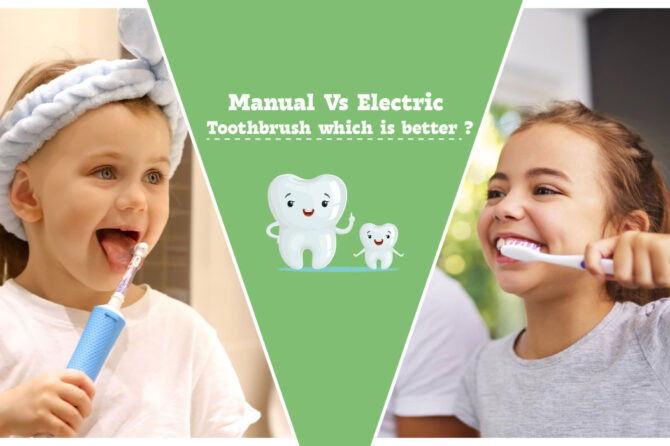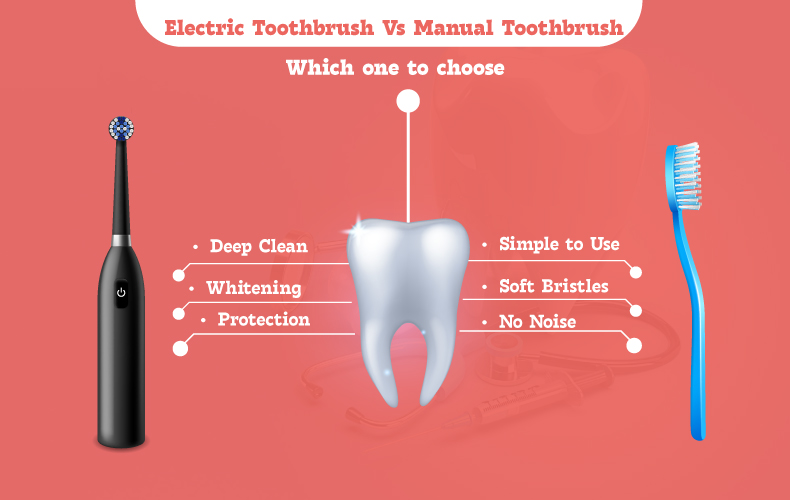
Manual Vs Electric Toothbrushes Which is better for Kids?
In the world of oral hygiene, the choice between manual vs electric toothbrushes has been a longstanding debate. As parents, it becomes crucial to make informed decisions, especially when it concerns our children’s dental health. This article aims to delve deeper into the manual vs. electric toothbrush dilemma, considering various factors that influence the choice for kids. By analyzing the advantages of both types, we can arrive at a well-informed conclusion for maintaining optimal oral hygiene in our little ones.
Understanding the Basics: Manual vs. Electric Toothbrushes
To begin with, let’s unravel the fundamental differences between manual vs electric toothbrushes . The traditional manual toothbrush relies on manual motion, requiring users to move the brush back and forth to clean their teeth thoroughly. On the other hand, electric toothbrushes operate through battery-powered or rechargeable mechanisms, often featuring oscillating or rotating brush heads for a more automated cleaning process.
Are Electric Toothbrushes Better for Kids?
Efficiency in Cleaning:
Electric toothbrushes have gained popularity for their efficiency in cleaning. The oscillating or rotating movements of the brush head can often cover more surface area and reach challenging spots, potentially providing a more thorough clean compared to manual brushing.
Built-in Timers:
Many electric toothbrushes come equipped with built-in timers, ensuring that children brush for the recommended two minutes. This feature can be especially beneficial in cultivating good oral hygiene habits from a young age.
Fun Factor:
Electric toothbrushes, often designed with colorful themes and characters, can make brushing a more enjoyable experience for kids. The entertainment factor may contribute to a positive attitude towards oral care, making it easier for parents to instill good habits.
Advantages of Electric Toothbrushes for Kids
Ease of Use:
Electric toothbrushes are generally easier for children to use, as the automated movements reduce the need for precise manual dexterity. This can be particularly advantageous for younger kids who are still developing their motor skills.
Enhanced Plaque Removal:
Studies suggest that electric toothbrushes can be more effective in plaque removal compared to manual ones. For parents concerned about their children’s oral health, this is one of the most important advantages of electric toothbrush which can be a decisive factor in choosing an electric toothbrush.
Interactive Features:
Some electric toothbrushes for kids come with interactive features such as Bluetooth connectivity and apps that monitor brushing habits. These features can engage children in their oral care routine, turning it into a learning experience.
Advantages of Manual Toothbrushes for Kids
Cost-Effectiveness:
Manual toothbrushes are generally more affordable than their electric counterparts. For families on a budget, opting for manual toothbrushes may be a practical choice without compromising on dental hygiene.
Portability:
Manual toothbrushes are compact and do not require batteries or charging. This makes them more portable and convenient for travel, ensuring that children can maintain their oral hygiene routine even when away from home.
Skill Development:
Using a manual toothbrush encourages the development of fine motor skills in children. The controlled movements required during manual brushing can contribute to the overall coordination and dexterity of young hands.
Making the Right Choice: Considering Individual Needs
It’s essential to recognize that there is no one-size-fits-all answer when it comes to choosing between manual and electric toothbrushes for kids. When making the decision between manual vs electric toothbrushes for kids, it’s crucial to take into account various factors that contribute to individual needs. Consider the child’s age, evaluating whether they have developed the motor skills needed for effective manual brushing or if the automated features of an electric toothbrush would better suit their capabilities.
Additionally, take into consideration the child’s comfort level with either type of toothbrush and any specific oral health requirements they may have. Tailoring the choice to these individual factors ensures a more personalized and effective approach to children’s dental care.
Conclusion
In the end, the choice between a manual and an electric toothbrush for kids is not a matter of one being inherently superior to the other. Both types have their merits, and the key lies in finding the right balance that suits the individual needs of the child. Whether it’s the fun and efficiency of an electric toothbrush or the simplicity and affordability of a manual one, what matters most is fostering a positive attitude towards oral hygiene from an early age.
As parents, our responsibility is not just to choose the right toothbrush but to instill a lifelong commitment to good oral health in our children. In the manual vs electric toothbrushes debate, the winner is ultimately the one that encourages consistent and enjoyable dental care habits for our kids.
Leave a reply
